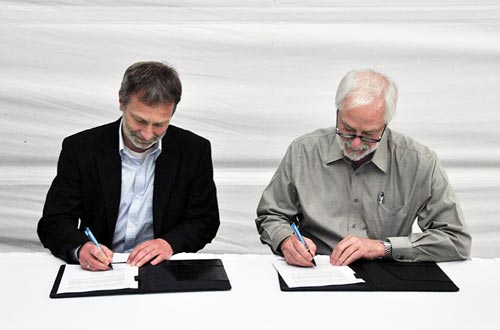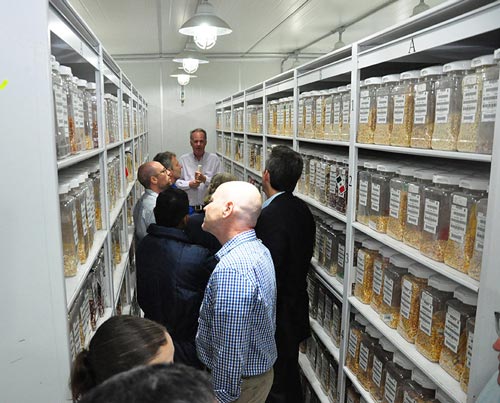Carissa Wodehouse/CIMMYT
On 20-22 May, CIMMYT hosted a summit with researchers from Oak Ridge National Laboratory (ORNL), a U.S. Department of Energy facility that is the largest multipurpose science laboratory in the U.S. and a committed member of the Knowledge Systems for Sustainability community of practice.
CIMMYT and ORNL began interacting in 2011, with CIMMYT leadership visiting ORNL in 2013. This summit was the formal realization of the commitment between the two groups. Bram Govaerts, associate director of CIMMYT’S Global Conservation Agriculture Program, gave an overview of the necessity for collaboration by referring to a recent National Geographic article, “Feeding 9 Billion,” that offered a five-step plan to sustainably increase the global food supply:
1. Freeze agriculture’s footprint
2. Grow more on the farms we already have
3. Use resources more efficiently
4. Shift diets
5. Reduce waste

The first four suggestions, Govaerts pointed out, were being directly addressed at the summit. Technology developed at ORNL will play a major role, through the improved use of big data, assessment tools, sensors and controls. One example described by Jay Gulledge, director of ORNL’s Environmental Services Division, is a laser-based infrared computed tomography spectroscopy tool that can read the greenhouse gas emissions of an area.
Virginia Dale, ORNL Corporate Fellow in the Environmental Services Division, addressed how farmers, data specialists and others are having different conversations around the same topics. “When people talk about food security, they mean different things; there’s no agreement in the world.” To create a common starting point, Dale described ORNL’s efforts to determine specific environmental and socioeconomic sustainability indicators that add value to the entire community.

On the second day, the morning was dedicated to creative, collaborative brainstorming to specify work for each of the five task areas. Stan Wood, senior program officer in the Agricultural Policy and Global Development Program at the Bill & Melinda Gates Foundation, noted a recurring tension among all task groups between focusing on external audiences versus serving internal scientists’ needs. He described how the science community tends to ask for a model, while visitors to the Gates Foundation will ask “so what difference does it make?” Wood suggested focusing both on the practitioners (will it actually be helpful in the field?) and the beneficiaries (are they front and center?) to create a strong human narrative.
Molly Jahn, professor in the Laboratory of Genetics and Department of Agronomy at the University of Wisconsin-Madison, reviewed the partnership potential including commercial and media groups, common resources and a focus on near-term rather than hypothetical goals. “We’re on the edge, and not everything we commit to or try works,” she said. “Challenges happen, and that is part of the experiment. Those challenges themselves are deeply informative.”
CIMMYT Director General Tom Lumpkin closed the summit, describing Jahn as “a living matrix maker … she gets us out of our silos.” He continued, “so much could be done if we had all of the data, all of the research projects that have disappeared into paper recycling and digital trash cans.” Acknowledging the senior CIMMYT staff present, Lumpkin emphasized that they are people who have spent time “on the ground, in the villages, who have looked farmers in the face. They can bring a lot to the discussion.”
 Climate adaptation and mitigation
Climate adaptation and mitigation 
